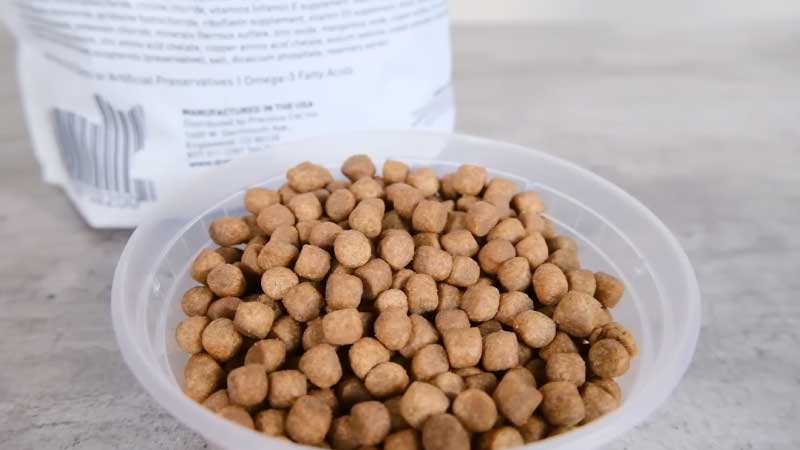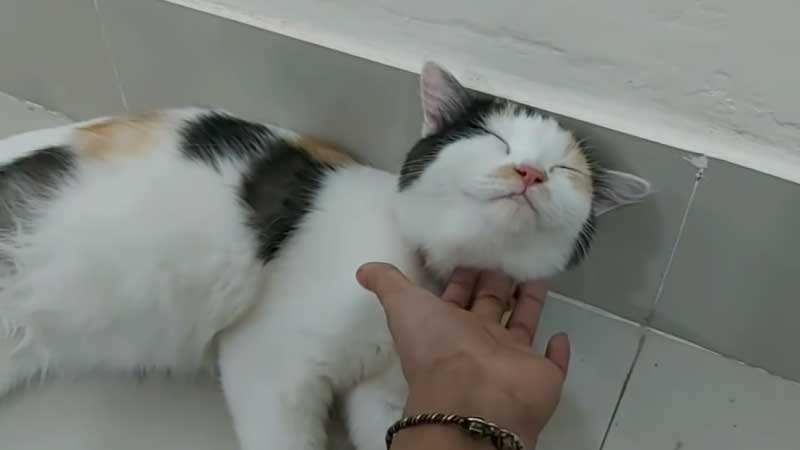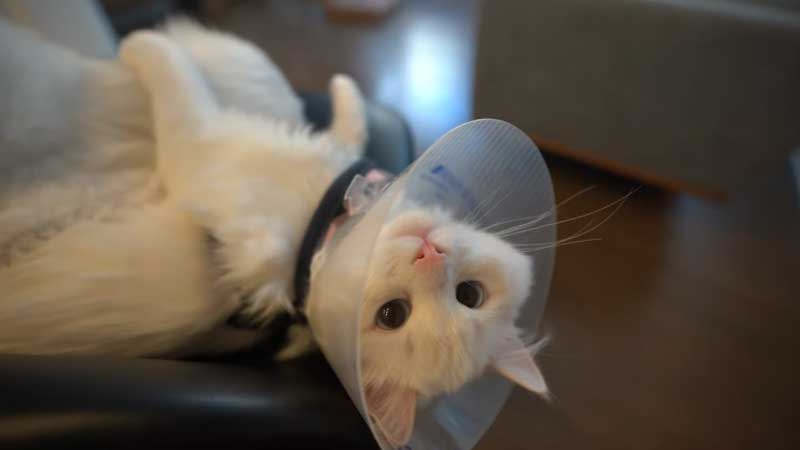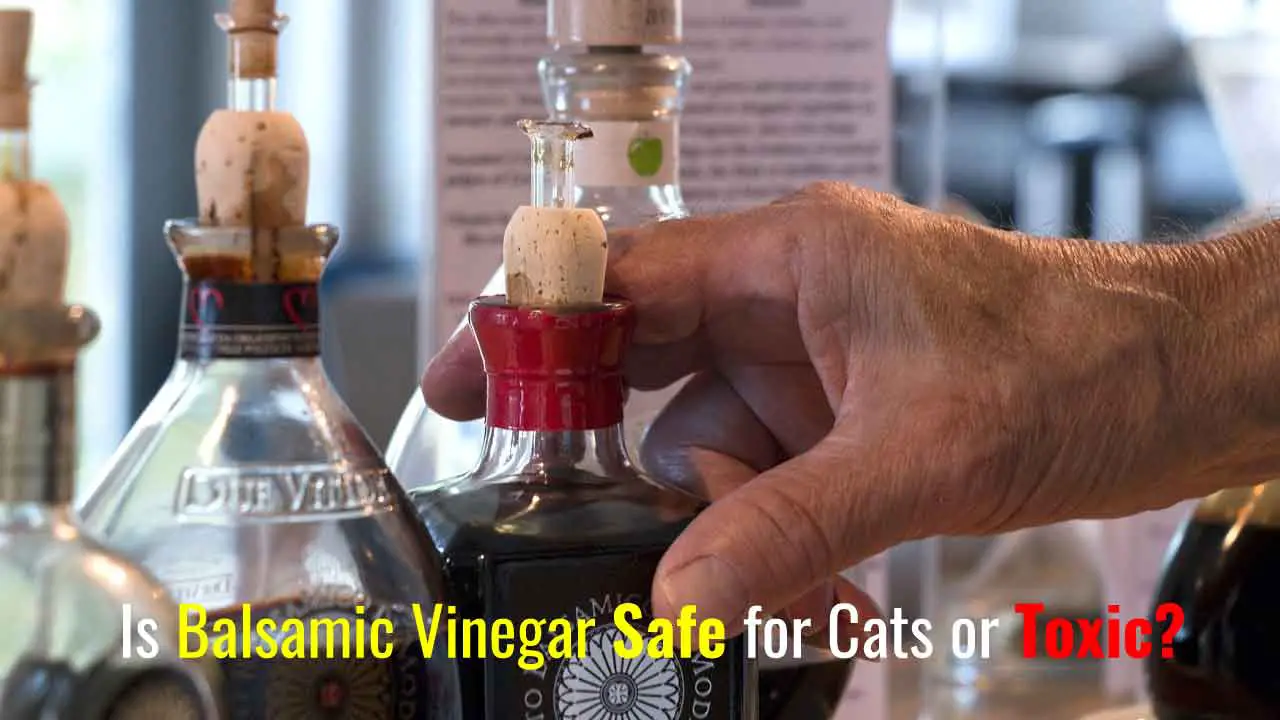Like humans, the dietary requirements of our feline friends change as they get older. Ever noticed how your senior kitty might struggle with those larger chunks of kibble? Or perhaps they’re just not as excited about mealtime as they used to be?
You’re not alone in this observation, and there’s a tasty solution: small kibble cat food tailored for the senior whiskers in your life. In short, the best small kibble cat food for older or senior cats offers a balanced blend of nutrients in a size that’s easy for them to munch and digest.
But there’s more to this than meets the eye. Stick with us, and let’s go deeper, ensuring your older cat doesn’t just eat, but truly relishes every bite!
Table of Contents
Why Small Kibble for Older or Senior Cats?

As our beloved cats transition into their golden years, their dietary needs and physical capabilities evolve. Just like how senior humans may opt for softer or smaller bite-sized foods, our senior cats can greatly benefit from smaller kibble. But what exactly are these benefits? Let’s delve into why small kibble might just be the dining upgrade your mature kitty has been silently wishing for.
Benefits of Small Kibble Size for Senior Cats
- Easier to Chew and Digest: Age can take a toll on a cat’s dental health. Teeth might become more fragile, or some may be missing altogether. Small kibble is easier for senior cats to chew, reducing the risk of dental injuries.
- Enhanced Flavor and Aroma: Due to its compact size, small kibble often packs a more concentrated flavor and aroma. For senior cats whose sense of smell or taste may be waning, this can reignite their enthusiasm for mealtime.
- Reduced Choking Risk: The smaller size ensures there’s a minimal risk of choking, especially crucial for older cats who might not have the same chewing vigor or coordination as their younger selves.
- Better Nutrient Absorption: Many high-quality small kibble cat foods are formulated with senior cats in mind, ensuring they receive the essential nutrients in every bite, supporting their aging metabolism and specific health needs.
Considerations When Choosing Cat Food for Older Cats: A Thoughtful Feeding Guide

It can be difficult to select the best food for our elderly cat friend. Their needs shift, and what once was their favorite dish might no longer be suitable. As your cat grows older, their dietary requirements and preferences evolve, and so should the food you offer. Here are some key considerations to keep in mind when navigating the world of senior cat nutrition:
Nutritional Content and Quality
Ensure the food offers a balanced diet, tailored to the specific needs of older cats. This might mean higher protein content, fewer calories, or additional supplements. Opt for cat food that lists premium sources of protein (like chicken, fish, or turkey) as its primary ingredients rather than fillers or by-products.
Digestibility
Older cats often have more sensitive stomachs. Look for foods labeled ‘easily digestible’ or those that contain probiotics to support gut health.
Texture and Size
As discussed earlier, smaller kibble can be easier for senior cats to chew, especially those with dental issues. Some older cats might prefer wet food over dry kibble due to its softer texture and increased moisture content.
Special Dietary Needs
Consider any specific health issues your senior cat might have, such as kidney problems, diabetes, or arthritis. Some cat foods are formulated to address these specific concerns.
Additives and Fillers
Avoid foods with excessive artificial colors, flavors, or preservatives. Natural is usually better, especially for senior cats. Watch out for unnecessary fillers like corn, wheat, and soy, which can be less nutritious and harder to digest.
Hydration
Older cats are often at a higher risk of dehydration. Wet foods can help increase their water intake, but always ensure fresh water is readily available.
Taste and Palatability
A balanced, nutritious diet won’t help if your cat turns their nose up at it. It might require some trial and error to find the flavor and texture your senior cat loves.
Price and Availability
While we all want the best for our pets, it’s essential to find a food that fits within your budget and is readily available either in local stores or online.
Consult Your Veterinarian
Always a top consideration: Your vet knows your cat’s health history and can provide personalized recommendations based on any health concerns or dietary needs.
In essence, feeding an older cat isn’t just about filling their bowl. It’s about understanding their changing needs and ensuring their golden years are filled with delicious, nutritious meals that keep them purring contentedly by your side.
Frequently Asked Questions (FAQs) About Senior Cat Nutrition
What are the signs that my senior cat needs a diet change?
- Weight Changes: Sudden weight gain or loss can be a sign that your cat’s current diet isn’t meeting their needs.
- Digestive Issues: Frequent vomiting, diarrhea, or constipation might indicate a dietary problem.
- Decreased Energy: If your cat is lethargic or less active, they might not be getting the nutrients they need.
- Dental Problems: Difficulty eating or chewing can signal dental issues, indicating a need for softer or smaller kibble.
- Dull or Flaky Coat: A lackluster coat can be a sign of nutritional deficiencies.
Is wet food better than dry kibble for older cats?
Neither is undoubtedly “better,” but wet food does have advantages for older cats. It’s often easier to chew, provides additional hydration, and can be more palatable. However, some kibble is specially formulated for seniors, and if your cat prefers it, that’s perfectly fine. It’s always good to discuss this with your vet to determine the best choice for your individual cat.
How often should senior cats eat?
Most senior cats benefit from being fed smaller amounts more frequently, typically 2-3 times a day. This can aid digestion and ensure steady energy levels. Always consult with your veterinarian for a feeding schedule tailored to your cat’s specific needs.
Are grain-free diets recommended for senior cats?
Grain-free diets can be beneficial for cats with specific allergies or intolerances. However, being “grain-free” doesn’t automatically make a diet superior. It’s essential to ensure that the food still provides a balanced nutritional profile suitable for a senior cat. Always consult with a vet before making significant dietary changes.
How can I switch my older cat to a new food brand?
Adjust slowly to avoid digestive upset. Start by mixing a small amount of the new food with their current food, gradually increasing the new food’s proportion over a week or so. Monitor your cat for any signs of digestive issues or disinterest in the new food, and consult your vet if problems arise.
Final Verdict
Choosing the best small kibble cat food for older or senior cats is more than just a buying decision—it’s a commitment to their well-being and comfort in their golden years. While the market is overflowing with numerous brands and claims, the best choices always prioritize quality, nutrition, and palatability tailored to the unique needs of mature felines.
One thing stands clear in our research on senior cat nutrition: small kibble can offer significant benefits, from ease of chewing to enhanced flavor profiles, making meal times a delightful experience for our aging companions.
When it comes to the best small kibble cat food for older or senior cats, let quality, genuine reviews, and your cat’s personal preferences guide you. With the right food, every meal can be a testament to the love and care you have for your feline family member.




